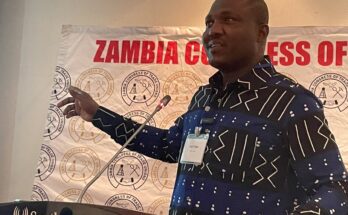He is the chief media strategist of Concerned Professionals Congress (CPC), a non governmental organisation. Emeka Nwankpa in this interview with EMEKA NZE says with over 2,000 former insurgent’s willing surrender to embrace FG’s rehabilitation programme, Boko Haram would soon be history.
Just before the last elections, there was a major drop in attacks by Boko Haram. What do you think was responsible?
Yes, it was generally acknowledged that the attacks dropped especially after the elections. Indeed, attempted Boko Haram attacks are repelled by our armed forces which have reclaimed territories hitherto occupied by the insurgents, restored law and order in greater part of the North East and continued to deny the insurgents the freedom of actions by degrading their capacity. Don’t forget that their affiliation with the Islamic State of West Africa Province (ISWISWA notwithstanding, there are positive results. The sacrifices of our gallant, courageous and professional armed forces led by the Chief of Defence Staff, General Abayomi Gabriel Olonisakin and his service chiefs are worthy of note.
We have generally witnessed a rapidly-changing dynamics of the war on terror where our military and the other security forces have increasingly turned the table against them. We are lucky to have a military with the heart and will to hold the country together. For all their sacrifices, we owe them a debt of gratitude especially when we remember that where we were is far from where we are now. The people of Borno and the other frontline states know that our military has done very well in the last three and half years. They dislodged Boko Haram to give them peace at a very great price. Indeed, the fight against terrorism since President Muhammadu Buhari came in May 2015 has been phenomenal through the resilience of the service chiefs.
How do you respond to the recent report that over 2,000 ex-Boko Haram members willingly surrendered to the federal government’s De-radicalization, Rehabilitation and Re-integration programme (DRR) code-named Operation Safe Corridor (OPSC)?
Yes, it was a very interesting development. The former insurgents are surrendering in droves owing to the opportunity offered by government’s de-
radicalisation and rehabilitation programme which has been on for over three years now. About 260 have been treated at the OPSC camp located at a quiet location known as Mallam Sidi in Kwami LGA, about 32 kilometres to Gombe.
It is a means of giving safe passage to battle-weary insurgents in line with international best practices towards returning the region to civil authority and peace. It was essentially designed to de-radicalise, rehabilitate and reintegrate surrendered insurgents. I see a positive correlation between
the withdrawal of these over 2,000 former insurgents from the bush and the massive turnout of voters recorded during the just-concluded elections in the
region.
What is the correlation?
Let me explain. Imagine for a moment what happens if these over 2,000 repentant insurgents were still in the bush fighting against the country. Please attempt a scenario-forecast and you will see that the sect has been severely diminished in size, strength and fighting will. This has forced them into desperate acts like joining ISWAP. Also, the Multi National Joint Task Force
(MNJTF) under the Lake Chad Basin Commission comprising Nigeria, Chad, Niger, Cameroon and Central African Republic currently under President Buhari’s chairmanship has maintained strategic blockade against them along the Borno North borders. It is no longer at ease for Boko Haram. With over 2,000 surrendered insurgents, it is no longer at ease for Boko Haram. Their source of personnel and other logistics are severed due to the supreme sacrifices of our military and other security forces which provided adequate security in the North East especially the Internally-Displaced Persons (IDPs) to vote en masse in the recently-concluded elections. Our military effectively
set the stage for the hitch-free elections. Normalcy has returned to the region because of this huge number of insurgents that have defected to embrace DRR. Night life has returned to Maiduguri and its environs. We owe the troops immense debt of gratitude.
How does Operation Safe Corridor operates in the de-radicalisation process?
The DRR has three phases: de-radicalisation, rehabilitation and re-integration which runs for 52 weeks before the clients graduate and re-inserted into their respective communities by the state governments who are the last link in the chain. Their interaction with the military is limited to security. We saw this during a recent visit to the camp at Mallam Sidi in Gombe by journalists and civil society activists. The commandant, Colonel Beyidi Martins, a very courteous and dutiful officer received us on behalf of the coordinator, Maj Gen BM Shafa. A British Broadcasting Corporation (BBC) crew had just left the camp indicating widespread interest in OPSC. There is splendid
camaraderie between the commandant and his co-opted staff of the National Security Adviser’s office, Prisons, Armed Forces, Police, DSS, Immigration, NDLEA, NEMA, National Identity Management Commission, NOA, NDE and the Civil Defence Corps. Officially called clients, the former insurgents enjoy excellent relations with their handlers to enable them re-discover themselves. OPSC is a joint multinational humanitarian operation conducted in line with international humanitarian and human right laws and Nigerian constitution. Mentioning Boko Haram in the camp is taboo. Comprehensive medical screening and profiling conducted by United Nations International Organisation for Migrations (IOM) revealed that they were largely conscripted and drugged into joining Boko Haram. They undergo psychotherapy, psycho-spiritual counselling, drug screening, western education/art therapy and other critical intervention therapies supervised by specialist teachers, counselors, clergies, psychologists, social workers, drug rehab specialists, dramatists and interpreters.
How do you respond to the insinuations that nothing may have actually changed as the saying goes that a leopard does not change its spot?
What we saw did not reflect those claims so such claims lack sufficient facts. The truth of the matter is that the former insurgents are released from the camp by the respective state governments for the communities. OPSC is deep and broad-based going by the composition of the OPSC national committee after a National Security Council meeting in September 2015 which approved its take-off. President Buhari appointed the CDS as chairman with the governors of Adamawa, Borno and Yobe states, Chief of Army Staff, Chief of Air Staff, Inspector General of Police, a director from Office of the National Security Adviser, director general State Security Service, Chief of Defence Intelligence and the director general National Emergency Management Agency, as members. Another beauty of OPSC is its mechanism to track and trace the ex-insurgents at any time. Their DNA samples are deposited at Defence Headquarters’ DNA Laboratory with their biometrics captured in the National Identity Card System. They are issued specially-coded identity cards after detailed debriefing by the Camp Intelligence Cell for re-integration and security. To enhance their health and boost self esteem as well as promote cordial interactions in the camp and nullify Boko Haram’s evil ideology in them, there are friendly games, indoor-outdoor sports and recreation facilities such as football field, volleyball court, table tennis, driveway for jogging. There is a skills acquisition centre built by the IOM to train them in vocational skills such as shoe making, leather works, farming, poultry, welding, tailoring, soap making and cosmetology, barbing, furniture, etc. We saw their finished products such as designer and customised shoes, wears, cream, soap, wardrobes, settees, eggs, vegetables, fish, etc.
What then happens after their graduation? Are there safeguards against possible stigmatisation and how easy is their re-insertion into their respective communities?
Conversations are ongoing concerning these issues but the DRR handlers have taken adequate measures to apprise representatives of the receiving communities of the programme’s details. Consultations through stakeholders and town hall meetings are conducted across the states and communities where former insurgents are being re-inserted. We learnt that top
government officials, influential traditional rulers, revered clerics and community leaders in the receiving states especially Borno-which has built a transit camp because it has the largest number, have done regular visitations to give the ex-insurgents a sense of belonging. Upon graduation, they take oaths of allegiance to be law-abiding citizens before a Sharia or High Court and transferred to their states for enrolment into NDE Skills Acquisition centres for further training. So far, 260 ex-insurgents have been treated. Another 95 who graduated in February 2018 were transferred to their states of Adamawa, Bauchi, Borno and Yobe fully re-integrated and re-settled. Minors were released to UNICEF for onward transmission to their foster parents. The last 150 who graduated on November 24, 2018, are still in the camp owing to resurgent attacks in the region but will be released to their states which have expressed willingness to receive them as the situation improves. DRR is laudable and should be sustained. It is a national necessity.



